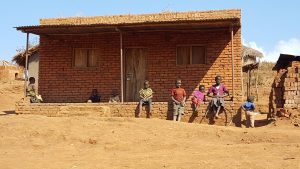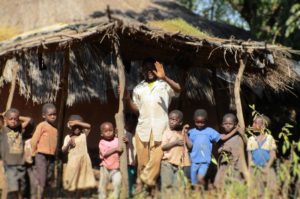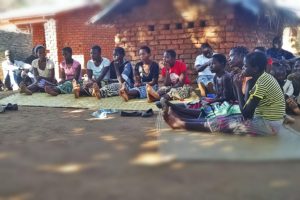
Its been a few weeks now since our team has returned from Malawi and while it certainly still feels fresh, in some ways it feels like I’m already a couple degrees removed from it. By “it”, I mean the myriad faces of former strangers who, just days prior, were unknown and separated by more than eight thousand miles. By “it”, I mean the sights and sounds of village after village, each unique, but also common in many ways, still yet stirring with activity. By “it”, I mean the look of astonishment in the eyes of an agogo (grandmother) as we approached and, to her surprise, knelt down with her for a brief exchange of translated words and untranslated smiles. By “it”, I mean the face-to-face encounter with a coming famine affecting millions in the region, gathering like a dark storm on the horizon. By “it”, I mean the words of prayer and encouragement, mixed with healthy doses of laughter, shared with the God-sent staff and volunteers of World Relief at different locations. The “it” is merely the two-letter word that fails miserable to stand in for a ten day whirlwind experience of injustice, fear, anxiety, joy, appreciation, gratitude and most of all, hope.
You see, when I get the inevitable question of, “How was your trip?” its hard to frame in just a few short words what I truly desire to communicate. I know there is a difference between a courteous inquiry as a means of small talk to acknowledge someone’s return versus a genuine curiosity and interest in what God is doing in a distant part of the world. Both are equally appreciated and both deserve meaningful answers. It is never easy to sum up in a 60-second “elevator speech” all of what one experiences on a mission trip, but I believe it matters that we try to do it anyway. If we fail to recognize the importance of sharing the experience with family, friends and coworkers, we, in some ways, are failing to make good on one of the most important aspects of mission trips – to shed light on the work that God is doing in this broken world.
I think the biggest takeaway for me is the hopefulness that I witnessed amidst some pretty dire circumstances. The level of poverty one sees in the rural villages, not even a few miles outside of a town, is beyond what we can relate to here in the U.S. That more than 50% of the populous lives at or below the poverty line is starkly evident well before the pavement turns to dirt with pockets of thatch-roofed, mud-brick dwellings dotting the landscape in all directions. In the rural areas, most families survive on subsistence farming and little more. They grow what they need to eat, maybe some extra for selling in the market, but that’s it. There is no meaningful welfare or social security safety net, so the most vulnerable, i.e. children, widows, HIV positive and the elderly, are often marginalized at best or forsaken at worst. The government does have some programs such as agriculture training, food distribution and emergency clinics, but for the most part, the local churches are the primary means of support for these communities. They often are the ones offering pre-school education, support groups and, through associations with affiliated denominational churches, provide some medical clinics and feeding stations. The churches seem to be on the front-line, more so than any governmental agency, when it comes to addressing the various needs of the rural communities.
That’s what is so exciting and, yes, hopeful, about what World Relief is doing in Malawi. For the last 3 years, they have been implementing a holistic model of church empowerment as their integral mission focus and, from what we witnessed, it is bearing fruit. The stated goal of their work is to empower the local church to serve the most vulnerable. Sounds simple enough, right? Think again. The simplicity of the mission statement belies the breadth of the effort and even more so, the depth of the challenges, but it also points to a fundamental truth – that the church is the means by which God is building His kingdom out of the messy brokenness of this world. In the next few posts, our team hopes to share additional details of how this work is being done and some of what we experienced that gives reason to be hopeful. Thank you for joining us on this venture.
 According to a recently published index based primarily on data from the ongoing Gallup World View World Giving Poll (2014), the United States ranks #2 in a survey of 145 countries around world for charitable giving, donations and volunteering. This seems to align with the notion that, by and large, we live in a relatively generous country that rarely shies away from an opportunity to help others. Whether it involves mobilizing resources and supplies in response to a natural disaster or getting people to rally around a good cause, my own anecdotal experience mostly affirms what the polls seem to indicate. This is not to pat ourselves on the back, nor should we diminish the good work that happens inside and beyond our borders as a result. Rather, for me, it begs a central question: Why do we give?
According to a recently published index based primarily on data from the ongoing Gallup World View World Giving Poll (2014), the United States ranks #2 in a survey of 145 countries around world for charitable giving, donations and volunteering. This seems to align with the notion that, by and large, we live in a relatively generous country that rarely shies away from an opportunity to help others. Whether it involves mobilizing resources and supplies in response to a natural disaster or getting people to rally around a good cause, my own anecdotal experience mostly affirms what the polls seem to indicate. This is not to pat ourselves on the back, nor should we diminish the good work that happens inside and beyond our borders as a result. Rather, for me, it begs a central question: Why do we give?